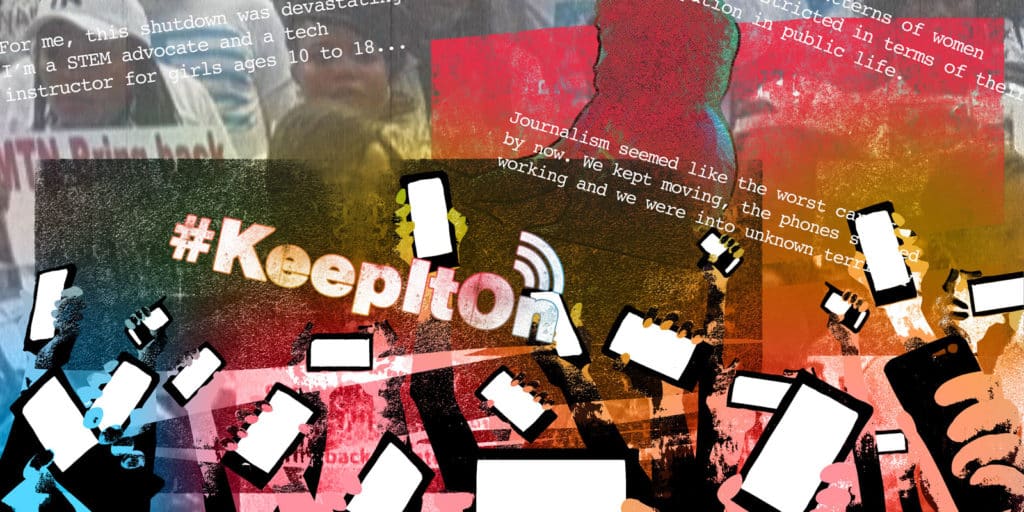
This is the latest installment in the Shutdown Stories series, documenting the impact of internet disruptions on lives around the world. If you have experienced an internet shutdown, please tell us how it affected you.
For many of us, late December is a time to be with loved ones and exchange gifts. If we can’t be together in person, we connect online. But internet shutdowns sever the lines of communication between family members who are separated from one another, isolating people both inside and outside the region where the shutdown is taking place.
Here we share the stories of four Cameroonians cut off from their families because of the ongoing internet shutdown in the country’s Northwest and Southwest regions, collected in partnership with Internet Sans Frontières, a member of the global #KeepItOn Coalition. You can help them by joining the campaign to #BringBackOurInternet and #KeepItOn.
During violent conflict, not being able to stay in touch can mean not knowing whether members of your family are still alive. In October 2017, Myra sent us this story, describing what it’s like to suffer under a massive region-wide shutdown that has isolated and endangered no fewer than five million people:
“I’m unable to reach my relatives. They last contacted me on the 1st of October to say they were fleeing our home in Bamenda. The Cameroon military forces invaded our family home and started beating, shooting, and maiming people. I am a very compassionate person, and this shutdown has had a big effect on me.”
Many people living in regions with frequent internet shutdowns and restrictions rely on money transfers, known as remittances, both for emergencies and to do business. They sometimes get these transfers from relatives who live far away. The more that governments order shutdowns and damage their own economies, the more people need to leave to follow career opportunities. But when a shutdown hits, the money they need can’t be transferred home.
Jarvis Edongnek is a 37-year-old engineer unable to support his family.
“[Before the shutdown,] I was able to communicate with my family back home, know their problems, and send them the financial needs they requested. This communication was either through Facebook or WhatsApp but both were cut [in the shutdown].”
Living away from home is difficult. It’s hard for the family members working abroad, many of whom struggle to find community in a new culture. Q Meny is a 30-year-old esthetician, homesick and concerned about her mother’s ailing health.
“I’m from Southern Cameroon. My parents and family still live there and we only communicate via WhatsApp, as calling cards are expensive and most are unreliable. I wasn’t able to communicate with my family for a long time and being in a strange land with barely any friends and no family, I have felt deserted and alone. I’m worried sick as well because my mother has been very ill yet I can’t talk to her. It’s sad and devastating.”
This past year was a time of great stress for many immigrants, with the rise of xenophobic politics and increased calls for invasive, rights-harming digital border searches. No one deserves to be cut off from their family, especially those who face other forms of oppression. As the year comes to an end, we celebrate the perseverance of the people who have shared their stories with us. We acknowledge their human right to communicate, to access and share information freely, and to carry on relationships with loved ones back home.
If an internet shutdown changed your life, you may be able to help us stop them
We welcome submissions of personal stories through our web form (available in multiple languages), or via email to [email protected] (PGP public key: 2869 76FD FDE8 AD96 A461 F05F D6FD 9F01 FF9D 6041).
About the #KeepitOn campaign
The #KeepitOn campaign consists of 143 organizations from 60 countries that are devoted to fighting internet shutdowns. Since we launched the campaign at RightsCon Silicon Valley in 2016, we’ve seen major victories: the U.N. Human Rights Council condemned internet shutdowns; 30 governments of the Freedom Online Coalition spoke out against shutdowns, as have the GSMA, the Global Network Initiative, and the African Commission on Human and Peoples’ Rights. And, together with local activists, we have helped to end major internet shutdowns in Cameroon and Gambia.
The submitted stories have been edited for clarity and style, but their content has not been changed.
